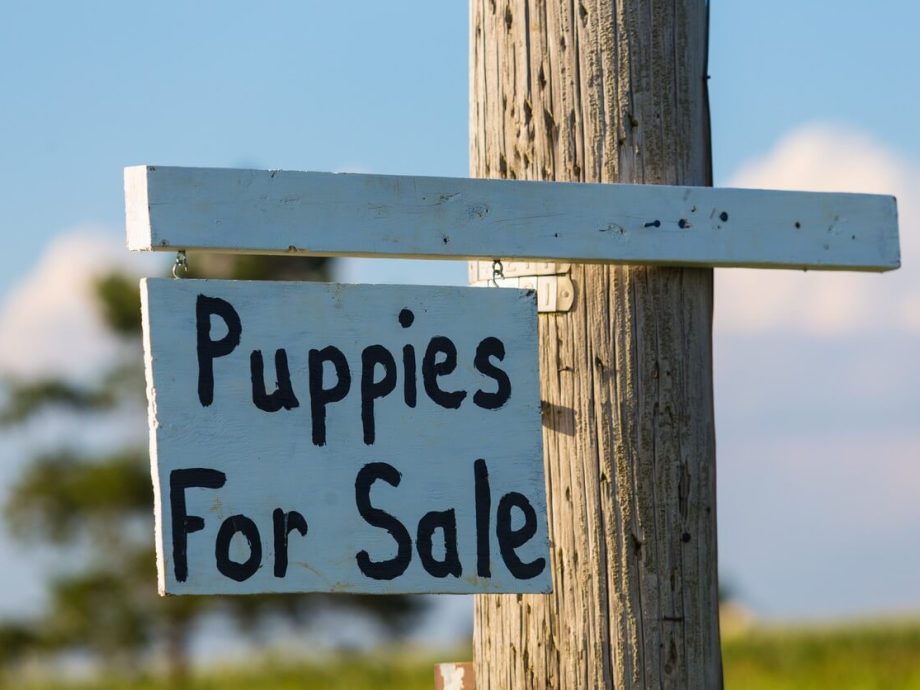All responsible dog owners want their own dogs to be free from disease, to have the best start and to have every chance of a happy, healthy life. How tragic then that, trapped in the cycle of puppy farming, puppies will have little or no chance of any of these and with every puppy we purchase from a puppy farm, we inadvertently encourage this cruel trade and line the pockets of unscrupulous breeders.
So how can I avoid buying a puppy from a puppy farm?
Most of us will start the search for a puppy by looking on-line and there are some things that you can look for:
- How many breeds are being offered? Very few legitimate breeders will offer a choice of different breeds. If you see other adverts for puppies at the same time when you are looking, compare the contact details against similar adverts for different breeds of puppy and if you spot duplication, walk away.
- Google the telephone number in the advert and see if it matches the location where the puppy is to be collected. Puppy farming often takes place well away from residential areas.
- Compare the wording of the adverts. Often the breeder will cut and stick wording across from a previous advert or ones for other breeds.
- Check for a vaccination history; puppies should normally be eight weeks before their first course of vaccination. If the ad says that they’ve been vaccinated and are less than eight weeks old they may well be from a puppy farm or may have been illegally imported. Legitimate breeders will be able to show you the vaccination history for the mother and for the puppies.
- Before Brexit, when pet passports for travel within Europe were required, puppies needed to be twelve weeks old to get a passport. If your breeder tells you that the puppy has a passport you should be suspicious that it will have been imported.
Of course adverts for puppies can be found in many different places and not just on-line so let’s start with some general rules.
These are things to avoid
- Never buy a puppy from a pet shop. In the UK and under Lucy’s Law, it is now illegal for any third party to sell puppies or kittens commercially. Most reputable pet shops will only sell birds, fish, reptiles and small furries but not cats or dogs.
- However hard this may be, never buy a puppy because you feel you are rescuing it. All that will happen is that you’ll create room for the next unfortunate puppy to take its place.
- Never agree to meet the breeder at a neutral location such as a car park, lay-by or motorway service station.
- Don’t trust anyone who encourages you to buy a puppy unseen and never place a deposit on a puppy unseen.
- Any responsible breeder will want to be sure that you are a suitable person to provide a home for one of their puppies. Be prepared beforehand and, if you are not asked all the appropriate questions, you should be suspicious.
These are things that you should do
- First consider whether a rescue dog from an authorised rescue centre might suit you better than taking on the added responsibilities of bringing up a puppy. There are also breed rescue societies which concentrate on puppies and dogs from specific breeds.
- If you need to have a puppy, a short time spent on your homework before viewing puppies will be far better than a decade or more of sorrow and disappointment, not to mention the disastrous effects that irresponsible breeding has on the puppies themselves.
- If you have a specific breed or ‘designer’ crossbreed in mind, always consult your veterinarian to find out what healthcare questions to ask and what to look for.
- Always avoid any breeder offering more than one breed unless you can be sure of their credentials.
- If possible, go to an approved and recognised breeder. In the UK, the Kennel Club offers a register of such breeders and in other countries, your veterinarian can recommend suitable breeders.
- Ask to see the puppy’s mother. You should be able to see the mother and puppy together – apart from the security this offers it is always good to see how your puppy might look in later years. If possible, ask to see the father too and ask all the relevant questions about their temperament and health record.
- Wherever possible, see the puppy with its litter mates and with the mother. You should be able to see the puppy’s current housing environment so ask to see where the puppies are being kept, where they sleep, what they are being fed. If in any doubt, walk away.
- Don’t just take a puppy because it is available. Waiting for the right puppy should help ensure you get a healthy puppy and waiting is always the better option than rushing into it.
- Ask to see the parents’ relevant health certificates. The parents should be up-to-date with vaccinations, flea and worming medication and any breed- specific checks that your veterinarian will recommend. For instance, certain breeds need to have their eyes and hips scored because of a breed disposition towards medical problems. If the breed standard insists on certain scores such as hip-scoring or eye scores, you should insist on seeing these too for both parents of the puppy that you are buying.
- Check whether or not your breeder will be willing to take the dog back if it doesn’t work out. Any responsible breeder will agree to this and some will insist on it.
Remember the most important part of this process is that if you are in any doubt at all – walk away.
If you suspect that a breeder is a puppy farmer or that the puppies are underage and may have been illegally imported, report your suspicions to the relevant authorities. In most countries there is widespread recognition of the problems of puppy farming and a determination to stamp out this cruel trade.
The Kennel Club, RSPCA and other well established dog rescue charities have all signed up to a code of practice in an attempt to stamp out puppy farming and more details of what to do if you suspect that a breeder is a puppy farmer can be found at:






